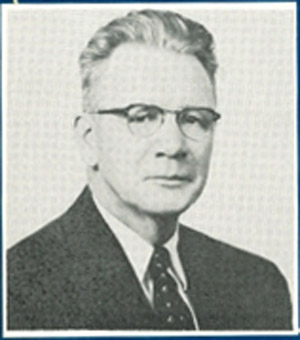Background on Arvo A. Solander

Arvo A. Solander
Born in Wichendon, Mass., on August 26, 1909, the civil engineer Arvo A. Solander graduated from University of Maine and received a Masters Degree in Sanitary Engineering from Harvard University.
During the early years of his engineering career, Solander worked with the State Highway Commission of Maine, building bridges and roads in Eden and Hancock during the summer sessions of his junior year 1930-1932. In the following months, however, the Great Depression made it impossible for Solander to find any work in engineering, leaving him to take a job with the Harvard Employment Bureau. Although he helped engineer a dike for the Quabbin Reservoir, then nearing completion as a water source for metropolitan Boston, Solander was hired only as a "sand dog," paid forty cents an hour for a forty-eight hour work week. His body fell into shape under the intense labor, though his back suffered the consequences.
After leaving the Harvard Employment Bureau, Solander worked for the State Department of Health at the Scituate Shellfish Plant in Scituate, Mass., taking responsibility for maintaining sanitation. While at Scituate, he took a series of examinations for the Massachusetts State Health Department, which opened the door for him to work in industrial waste.
From 1934 to 1935, Solander worked at a Tuberculosis Sanatorium in Rutland, about fifteen miles northwest of Worcester, Mass. Funds for this position were supplied in part by the New Deal relief agency, the Public Works Administration. He also worked as a salt marsh mosquito worker for the Massachusetts Reclamation Board, whose funds were supplied by another New Deal agency, the Civil Works Administration. From 1935 to 1937, Solander continued on his round of New Deal agencies, working as a teacher at Lake Dennison for the Civilian Conservation Corps, operating under the jurisdiction of the U.S. Army. The CCC was said to be the best of the various relief agencies in operation during the depression years. Solander taught mechanical drawing three nights a week with a modicum of success, however according to Solander, men selected in relief roles did not seem always interested in broader education.
For the next twenty years, Solander worked as a civil engineer for a long succession of agencies and water-related projects. His work in surveys of water, sewage, and garbage works in Alabama, Florida and Louisiana, he wrote, only "served to show the need for Federal Legislation to conserve one of our most valuable natural resources, water." From February 1941 through May 1942, Solander helped engineer the drainage of almost 18,000 square miles in the Cumberland River Basin while his services were loaned to the Tennessee State Department of Health. During this time, he volunteered for military service with the Army's Sanitary Corps, writing "In retrospect, I can very truthfully say that my work and accomplishments as a commissioned Officer in the Sanitary Corps, U.S. Army, were a greater contribution to the continued freedom of the United States than my civilian activities after the 1941 maneuvers." Solander was commissioned a First Lieutenant, but by the end of the war, he had risen to the rank of Major.
In 1947, while stationed at the District Office of the U.S. Public Health Services in New Orleans, Louisiana, Solander aggravated a hernia and had to be confined to bed for several days. While laid up, the funds for his research on septic tanks ran low, and the project was shut down. "As the son of Finnish emigrant parents," Solander wrote, "it appears that I had reached my peak, namely, the honorary rank of Major in the Sanitary Corps of the United States Army. It did not appear quite proper to assign a man of my age, education, and experience to this type of work. As the record of the past twenty years is reviewed, it seems that as much or more physical work has been done since my Army career than at any other time in my professional career."
While en route from Cincinnati to Winchendon, Solander was hired by the firm of Tighe and Bond, a company that contracted for sewerage work, mostly in West Springfield and Easthampton. Unfortunately, when the owner of Tighe and Bond passed away and the company was bought out, Solander was again out of work. Calling upon his training as a land surveyor, and purchasing the necessary tools, Solander set out on a new path. Becoming familiar with the Hampshire County Commissioners, he took a venture into the political field, running for the Board of Public Health in South Hadley in 1950. Short of cash and time for his campaign, Solander was edged out by 200 votes.
Arvo A. Solander died at the age of 66 on June 9, 1976, in Holyoke Hospital. A member of the First Congregational Church of South Hadley, the American Society of Civil Engineers, American Congress of Surveying and Mapping, Water Pollution Control Federation, Society of American Military Engineers and Engineering Society of Western Mass, he left behind his wife, Elizabeth (Ray) Solander, and three children: Richard F. Nancy Miller, Miss Joan L. Solander, and Mrs. Gregory V (Sarah) Camp.

